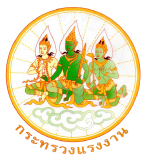The Ministry of Labour’s Inspector-General Mr. Soothi Sukosol spoke about Thailand’s current worker conditions in the fishing industry. He said that the Ministry of Labour has gathered information from the 22 Port In – Port Out Coordination Centers, monitoring the number of workers who have been issued with the seaman book from the Marine Department and the seabook from the Department of Fisheries, to evaluate labour shortages. Statistics have revealed 114,665 registered workers in the fishing industry comprising 47,587 Thai nationals and 67,078 migrant workers holding the pink card. In comparison to the quantity of fishing vessels and boat sizes, demand is estimated at around 115,761 workers, indicating a mere 1,000 worker shortage. The government has also given opportunities for employers to report intention to employ migrant workers in the fishing industry through MOU channels at all time, whereby employers can also seek advice from all provincial labour offices.
Employers had reported a shortage of 70,000 workers, whereby suggestions were made to import workers from neighbouring countries through MOUs, and to allow new rounds of worker registrations. The question is currently where the 114,000 registered migrant workers are, as only 30,000 workers from the fishing and seafood processing industry have registered to get a 2-year extension – the deadline is 31 March 2017. Mr. Soothi said that this would be the last opening for registrations, whereby in future, migrant workers would need to enter through MOU channels only.
Mr. Soothi further explained that the Ministry of Labour has asked for cooperation from businesses to adhere to the laws and to consider motivation for migrant workers, particularly in protection and occupational working conditions. For example, a consistent working break of 10 hours within the 24-hours day and at least 77 hours within a 7-day working week, cleanliness of food and beverage provided on vessels, issuance of a written contract, provision of medical examination to ensure sufficient health and provision of knowledge on using tools and safety devises on the fishing vessels. Suggestions were also given to have a basic first-aid kit onboard and rights to seek medical attention onshore always, and social security protection to ensure equality. With such measures in place, Mr. Soothi said that employers would have more chance or attracting and retaining migrant workers.
“The Ministry of Labour has always worked closely with the Fishing Association to understand underlying problems and find solutions. In February of 2017, a meeting was held between the Fishing Association and the Ministry of Labour’s executives to find solutions to initial problems, such as the suggestion for the Samut Songkram Employment Office to work with the Fishing Association to pilot recruitment and training for Thai fishing workers. A plan was also devised to import Vietnamese, Burmese, Laotian and Cambodian workers through MOUs, which have already passed some negotiation. Labour Minister General Sirichai Distakul has given direction to work per the systems laid out and to collaborate with all relevant units closely,” said Mr. Soothi.
—————————————
Spokesperson and Publication Sub-Division/
Bureau of Public Relations – News/
6 March 2017




